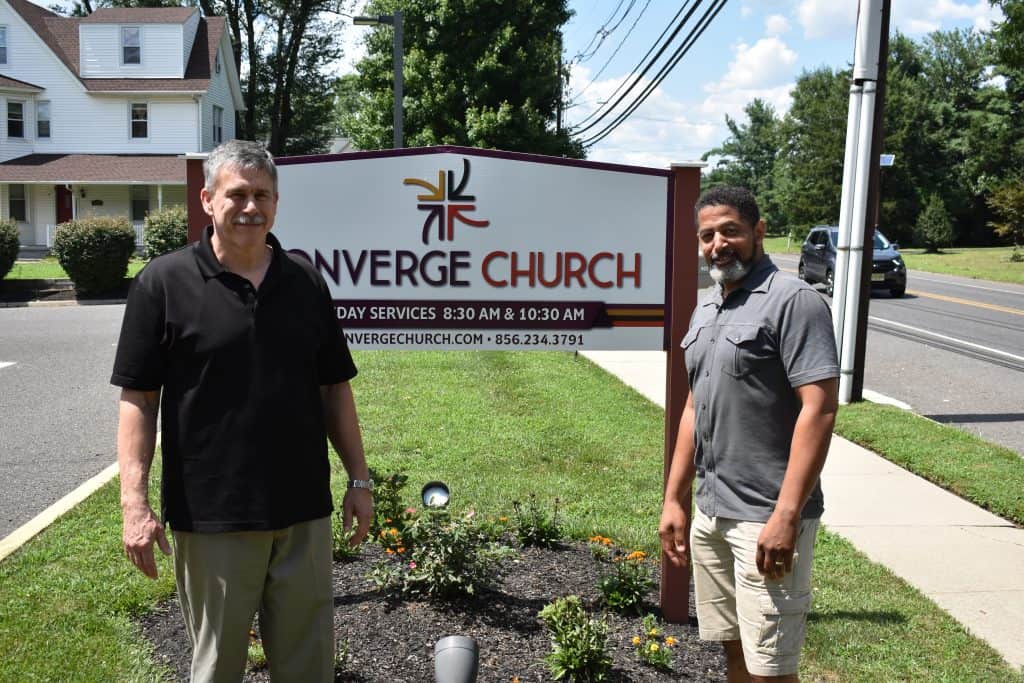

Last year, The Sun spoke with two pastors who shared a unique vision for their respective congregations. In September 2018, Pastor George Bowen of the Maranatha Christian Fellowship, a predominantly white church, and Pastor Jonathan Leath of Destiny Church, a predominantly black church, merged their two flocks under one roof in Moorestown, driven by this shared vision.
The two church leaders were inspired by the words of Dr. Martin Luther King Jr., who famously called 11 a.m. on Sunday morning, “the most segregated hour in this nation.”
“We’re bringing King’s dream to life, and the gospel is the reason we can do that,” said Leath.
“We wanted to bring our churches together, black and white, because the divide in our nation is very obvious and to put our money where our mouth is,” said Bowen. “We intended to do it because of Christ, he prayed that the church would be one.”
One year later, it seems the grand experiment is paying off. The two congregations remain under one roof and have adopted an appropriate new moniker, Converge Church. They are looking forward to celebrating their first anniversary this September.
According to the pastors, the two original churches had come together for worship services before the official merge so there was already an amount of familiarity established going into the process.
The merge itself was met with near-universal celebration on both sides. Tim McHale was originally a member of the Maranatha Christian Fellowship who recalls his own excitement upon hearing the news.
“It felt natural. It felt like what was supposed to happen,” said McHale. “We had developed a relationship for a year or two up until that point so to come together felt natural.”
It was after this initial excitement of the merge had settled that Leath and Bowen say the real work began.
Leath compares the groups coming together to a marriage.
“The wedding is easy, yeah you’re frustrated planning all these things, but the marriage is where you really have to work at it,” said Leath. “We were excited about the wedding, now we’re working on the marriage.”
Although the majority of both congregations embraced the merge and joined in the celebration, both pastors will concede not every one of their members was on board with the change.
“There was an early group of people that were very enthusiastic about it, then you had this large group of people who were like, wait and see, and then there were some like ‘no way,’ shut down up front,” said Bowen.
“We both lost members because of this coming together, everybody was not excited about it, but the great thing about it was the ones that were, were like ‘wow, this is God,’” said Leath. “We chose to focus on those who were excited about what we were doing.”
The pastors met with members who had reservations about the change, introducing them to whichever of them the individual was unfamiliar with. This helped to ease misgivings some members had and provided answers they had about the people they would be joining with.
According to Bowen, they have even seen some families who left because of the merge return to the church over the course of the past year.
“We’re starting to see the fear that we had was just in our heads. It’s like, what were we afraid of? Why didn’t we do this sooner?” said Leath.
An important part of ensuring the success of the merge was making sure there was equal representation in the leadership of Converge Church. Bowen and Leath share pastoral responsibilities and key positions within the church are likewise held by members of both original churches.
Yolanda Frink, originally from Destiny Church, says she sees equal elements of both groups represented at Converge.
“We have taken things from Destiny Church, from Maranatha and brought it together. Everyone has their way of doing different things but now we’re doing it in a way that is Converge Church,” said Frink.
By striving to put their beliefs into practice and promote unity, Converge Church hopes to stand as an example to other churches. In a time when we hear more and more about racial division in our country, this church seems to have found a reason to come together.
“The church is every nation, every tribe, every tongue worshipping together. If your gospel doesn’t work in racial unity, then you’ve got a false gospel. You better take a fresh look at it, because it ought to bring people together,” said Bowen.









